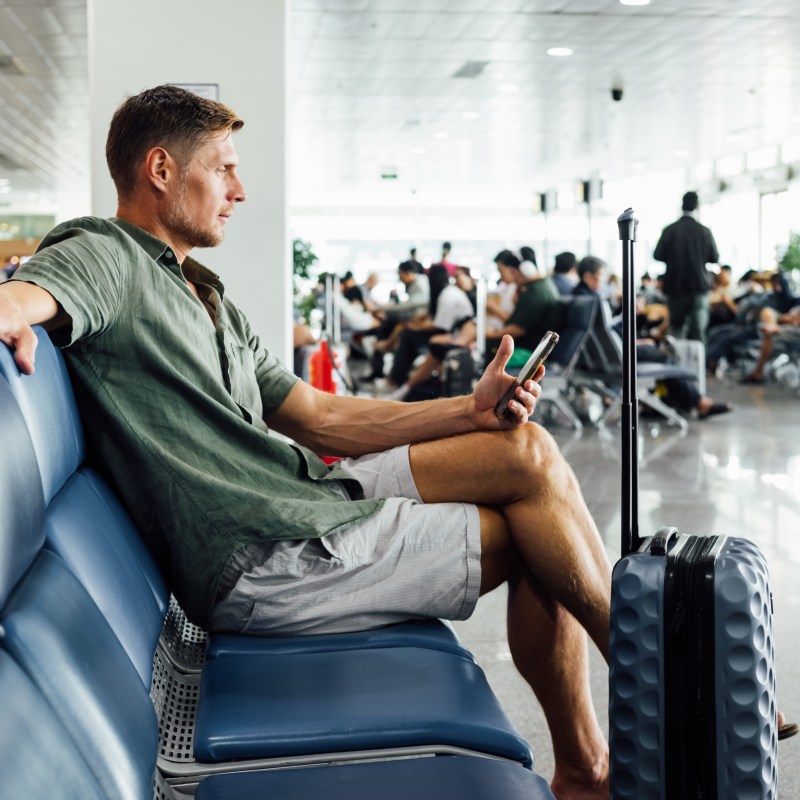
I’ve lived the nightmare before—
Videos by TravelAwaits
I traveled across the Atlantic and touched down in Miami. My two-hour layover turned into a three-hour layover. Then a four-hour delay.
On and on and on until the clock struck midnight and Miami International shut down for the night.
American Airlines rebooked me on a flight for the next morning before offering me a stay at an airport hotel. (There was no way to get to the airport hotel at that hour aside from paying out of pocket for a taxi, but that’s another story.)
The moral is this: Canceled flights wreak havoc on travel plans, especially during late-night connections.
Worst of all, many travelers don’t know what to do about canceled flights.
Whether or not you’ve faced this type of catastrophe, it’s worthwhile to know your options to have a head start. Here’s what you need to know about canceled flights in the US, your rights as a passenger, and how to save yourself from disaster.
Canceled flights: urgent vs non-urgent cases
If your flight is canceled or looks like it might be canceled, the first thing you need to do is gauge whether the cancelation is urgent or not.
In Miami, I could afford an overnight delay because the wedding I was attending didn’t start until the next day. Though I’d be pushing it and arriving a bit late, the rebooked flight worked.
But that’s not always the case.
If you’re traveling for a major event or if you’re going to miss a connecting flight thanks to a canceled flight, then you’re in the urgent category.
So, what’s your best option in these cases?
You need to immediately rebook your flight (with your original airline or another) to get to your destination on time. It’s that simple.
But let’s dig a little deeper. How do you know if the airline will rebook you or whether you need to do it yourself? And who pays when canceled flights disrupt your travel plans?
For canceled flights, answer these questions first
Here are a few questions that can help you better gauge your situation and what to do next. Your first concerns should be: Rebooking the canceled flight, getting to your destination on time, and getting compensated for any problems brought on for the airline,
Was the flight canceled due to the airline’s negligence?
If the airline canceled a flight due to issues like understaffing, overbooking, rescheduled flight routes, and similar administrative reasons, the airline is responsible for either rebooking your flight or providing cash compensation.
In other words, in these cases, the airline must get you to your destination or provide an automatic refund.
However, if your flight was canceled due to poor weather, air traffic staffing, or mechanical issues, then the airline is off the hook. In other words, they were within their rights to cancel the flight.
In these cases, the airline still should rebook your flight—but you won’t have the option to receive compensation.
So, if an airline is responsible for the cancelation and you’re in an urgent position, you can rebook with another airline, and then wait to be reimbursed for that original flight. If you’re working with a time constraint, this is your best bet at getting to your destination on time and not incurring hefty costs.
What’s the fastest way to get in touch with an airline?
It’s not always easy to figure out why a flight was canceled and what comes next—even if you know your rights as a passenger. The easiest way to get in touch with an airline isn’t via the gate agents or the kiosks at the airport.
The fastest way to get in touch with an airline is via its app or an international phone line. If you want to immediately rebook your flight, then the app or collect calls are your best bet.
Do you have travel insurance?
If you have travel insurance, your policy probably covers canceled flights. One of the fastest ways to resolve issues stemming from canceled flights is to review your travel insurance policy, and then activate its canceled flight benefits.
This should get you on another plane quickly without you needing to bust out the credit card.
What to do when your flight is canceled: step-by-step guide
- Determine the reason for the cancellation and document it. This will help you gain an understanding of the situation, your options, and what comes next. It will also help you demonstrate your need for reimbursement later on in case there are any conflicting reports.
- Decide whether you can wait for a rebooked flight or not. If you’re in an urgent situation, you might not be able to wait for the airline to rebook you on another flight—especially if it’s scheduled to take off the next day.
- If you can’t wait for a rebooked flight, book another ticket and wait for reimbursement later on. (But remember that this only applies when the airline is at fault. If your flight was canceled due to poor weather, for example, you won’t receive compensation.)
- If you can wait for a rebooked flight, decide what option is best for you beforehand. If the airline is at fault for the cancelation, you can choose not to accept travel credits in favor of a cash refund. This would allow you to rebook with another airline without spending (a lot) more.
- Accept the airline’s offer or rebook with a new airline. Pro tip: If the cancelation and rebooking happen late at night, I suggest getting yourself to a hotel before the rooms fill up.
